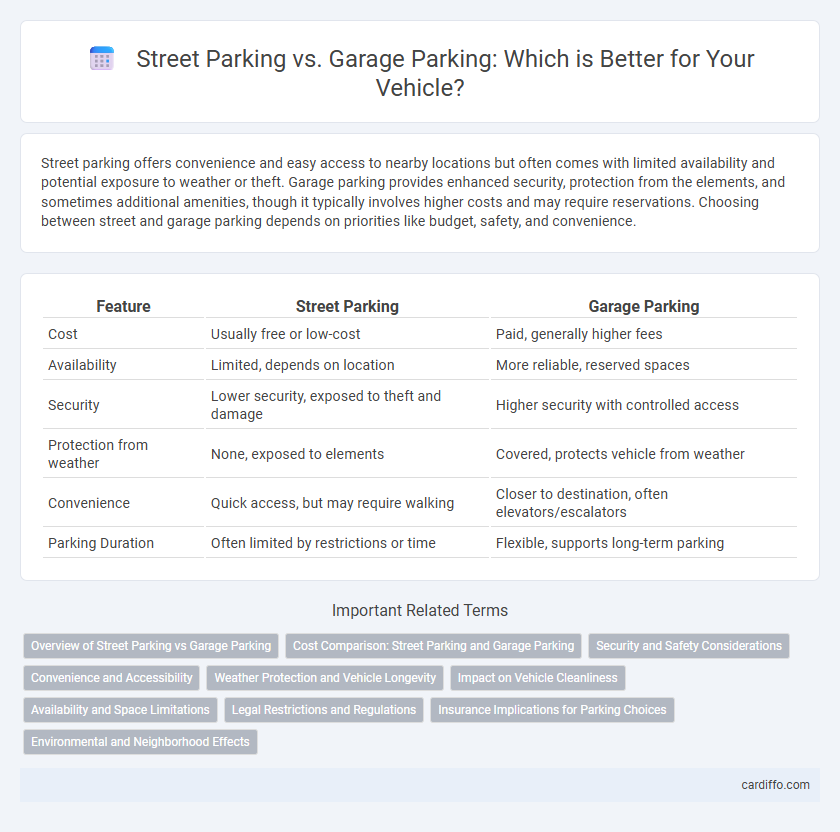Street parking offers convenience and easy access to nearby locations but often comes with limited availability and potential exposure to weather or theft. Garage parking provides enhanced security, protection from the elements, and sometimes additional amenities, though it typically involves higher costs and may require reservations. Choosing between street and garage parking depends on priorities like budget, safety, and convenience.
Table of Comparison
| Feature | Street Parking | Garage Parking |
|---|---|---|
| Cost | Usually free or low-cost | Paid, generally higher fees |
| Availability | Limited, depends on location | More reliable, reserved spaces |
| Security | Lower security, exposed to theft and damage | Higher security with controlled access |
| Protection from weather | None, exposed to elements | Covered, protects vehicle from weather |
| Convenience | Quick access, but may require walking | Closer to destination, often elevators/escalators |
| Parking Duration | Often limited by restrictions or time | Flexible, supports long-term parking |
Overview of Street Parking vs Garage Parking
Street parking offers convenient access and generally lower costs but often involves limited availability, exposure to weather, and security risks. Garage parking provides enhanced protection from elements, increased safety, and sometimes additional amenities like surveillance and lighting, but it usually comes with higher fees and potential restrictions on hours. Choosing between street and garage parking depends on priorities such as budget, security, and proximity to the destination.
Cost Comparison: Street Parking and Garage Parking
Street parking typically costs less than garage parking, with daily rates often ranging from free to a few dollars depending on the city and time restrictions. Garage parking offers more security and convenience but usually charges hourly rates from $5 to $20, leading to higher overall expenses for extended stays. Comparing costs, street parking is more budget-friendly for short durations, while garage parking suits those prioritizing safety despite the premium price.
Security and Safety Considerations
Street parking exposes vehicles to risks such as theft, vandalism, and accidental damage due to higher public accessibility and limited surveillance, affecting overall security. Garage parking offers enhanced safety features including controlled access, surveillance cameras, and protection from weather elements, reducing the likelihood of damage and unauthorized access. Choosing garage parking significantly improves vehicle security and occupant safety compared to street parking environments.
Convenience and Accessibility
Street parking offers immediate access to destinations with minimal walking distance, often located directly outside buildings or homes. Garage parking provides enhanced convenience through protection from weather elements and increased security, typically featuring multiple entry points and elevator access. Accessibility to street parking depends on availability and local regulations, while garages usually offer designated spaces and longer parking durations.
Weather Protection and Vehicle Longevity
Garage parking offers superior weather protection by shielding vehicles from rain, snow, and harsh UV rays, significantly reducing exterior damage and paint fading. In contrast, street parking exposes cars to fluctuating weather conditions that accelerate rusting, corrosion, and interior wear caused by moisture and temperature extremes. Choosing garage parking enhances vehicle longevity by maintaining better overall condition and minimizing repair costs related to weather-induced deterioration.
Impact on Vehicle Cleanliness
Street parking exposes vehicles to environmental contaminants such as dust, bird droppings, tree sap, and pollution, leading to faster accumulation of dirt and potential paint damage. Garage parking offers shelter from these elements, significantly reducing the risk of grime buildup and maintaining a cleaner exterior for longer periods. Regular use of covered garage spaces helps preserve vehicle aesthetics and may lower maintenance costs related to cleaning and repainting.
Availability and Space Limitations
Street parking offers more widespread availability in urban areas but often comes with strict time limits and variable space sizes that may not accommodate larger vehicles. Garage parking provides secure, designated spots with consistent space dimensions, though availability can be limited during peak hours and in densely populated neighborhoods. Choosing between street and garage parking depends on balancing convenience, vehicle size, and duration of stay.
Legal Restrictions and Regulations
Street parking is often subject to local ordinances that regulate time limits, permit requirements, and restricted zones such as no-parking areas during rush hours or street cleaning schedules. Garage parking offers more consistent legal protection with formal agreements, signage, and adherence to building codes, reducing risks of fines or towing compared to street parking. Understanding municipal codes and signage is crucial to avoid penalties in street parking, while garage parking typically requires compliance with contractual terms and payment rules.
Insurance Implications for Parking Choices
Street parking often exposes vehicles to a higher risk of theft, vandalism, and environmental damage, which can increase insurance premiums due to elevated claims risk. Garage parking provides enhanced security and protection from weather elements, typically resulting in lower insurance costs and more favorable coverage terms. Choosing garage parking can lead to reduced liability concerns and potential discounts on comprehensive and collision insurance policies.
Environmental and Neighborhood Effects
Street parking increases air pollution and noise levels due to frequent vehicle idling and circulation searching for spots, contributing to urban heat islands and deteriorating neighborhood air quality. Garage parking reduces environmental impact by consolidating vehicles in controlled spaces, minimizing street congestion and lowering emissions. Neighborhoods with well-designed garages experience improved pedestrian safety, reduced traffic disruption, and enhanced green space preservation.
Street Parking vs Garage Parking Infographic

 cardiffo.com
cardiffo.com